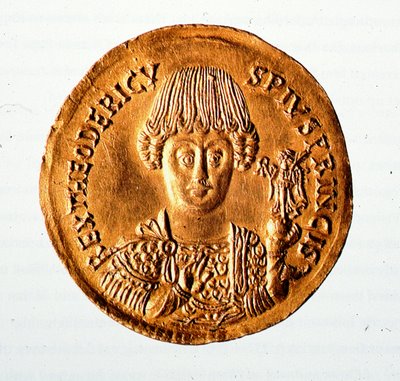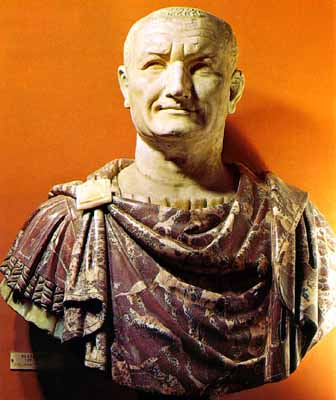Tuesday, November 07, 2006
Seven major Crusades between 1095 and 1270
Pope Urban II issues first call to Crusade in 1095
Crusade: armed pilgrimage to free the Holy Land from the Muslims
Thousands of people joined up
-Shows power of papacy
-New Vitality of the kingdoms of Europe
-Affirmation of the values of the knightly class: just war


First Crusade (1095-1099)
-Seljuk Turks
-Byzantium calls for help from the West
-incentive of penance
-Peter the Hermit
-large body of knights
-Captured Jerusalem in 1099
-Set up Latin Kingdom of Jerusalem


Second Crusade (1146-1148)
-Preached by Bernard of Clairvaux
-Disaster: why was God displeased?
1187 Jerusalem recaptured by Turks led by Saladin
Third Crusade (1189-1192)
-led by: Richard the Lion-Hearted (England), Philip Augustus (France), Frederick Barbarossa (Germany)
-Many problems; a few successes
-Richard negotiates a truce with Saladin
Fourth Crusade (1202-1204)
-Called by Innocent III
- entanglements with the Venetian state
- Crusaders sack the Christian city of Constantinople
Fifth Crusade (1217-1221)
-Directed at Egypt, the seat of Muslim power in the Middle East
-Also ends in disaster
-Both Led by Louis IX of France
-Sixth (1248) to Egypt
-Seventh (1270) to Tunisia
-Louis IX (St. Louis) died in Tunisia from plague

1291 Acre, final Christian city in Middle East, falls to Muslim forces
-End of Crusader states in the Holy Land
Tuesday, October 31, 2006
Carolingians were Franks
-Most successful ruler was Charles the Great: Charlemagne
(r. 768-814)
--wars of conquest
--pious
--Carolingian Renaissance
Great Invasions of the 9th and 10th Centuries
Muslim incursions from the Middle East and North Africa
-plundered coastal cities of the Mediterranean
-Conquered islands; took slaves
-looted the church of St. Peter in Rome in 846 A.D.

Magyars from the Asiatic steppes
-Invaded German and Italian territories from
late 800s to 955 A.D.
-plundered towns and monasteries
-defeated at Battle of Lechfeld in 955 A.D. by Otto I of Germany
-converted to Christianity
-settled Hungary


Vikings from Scandinavia
-Northmen, had a home economy based on agriculture and cattle, but land was scarce
-raiding expeditions in search of land
-warrior culture with goals of : land, wealth and fame
-most fearsome warriors in Europe
-longboats
-plundered churches and monasteries
-finally settle down: Rolf marries Gisela, converts to Christianity and receives lordship over the area of Normandy
Monday, October 30, 2006
Italian Peninsula:
Ostrogoths -- Theoderic
-blending of culture
Lombards
Gregory the Great (Pope from 590-604)
Iberian Peninsula:
Visigoths
King Reccared (r. 586-601)
-Persecution of Jews
Muslim conquest of Spain 711 A.D.
Angles, Saxons, Jutes, Frisians
Missionaries:
St. Patrick
St. Columba
St. Augustine of Canterbury
-Synod of Whitby 664 A.D.
The Venerable Bede (673-735 A.D.)
The Continent (France)
-Kingdom of the Franks
-Merovingians: Clovis (r. 481-511)
-Charles Martel
--Battle of Poitiers 732 A.D.
-Carolingian Empire
Tuesday, October 24, 2006
-Split of the Roman Empire between East and West
-East becomes Byzantine Empire
-Why did the Roman Empire "Fall"?
-about 210 reasons
-dynamic problem
-"Barbarian" invasions were a major reason.
 -In the 4th Century, the Huns attack the Visigoths
-In the 4th Century, the Huns attack the Visigoths
-Visigoths move into Roman territory
-Visigoths revolt and win Battle of Adrianople in 378 A.D.
-King Alaric sacks Rome in 410 A.D.
 -Romans withdraw from Britain and other northern territories
-Romans withdraw from Britain and other northern territories
-Alans, Burgundians, Sueves, Vandals, Ostrogoths
-Barbarian tribes start to found their own independent kingdoms
-Last Roman emperor in the West killed in 476 A.D.
Byzantine Empire
-City of Constantinople
-Roman governmental traditions; Greek culture
-Emperor had more power over the church
-Justinian (r. 527 - 565 A.D.)
-Wars of conquest
-Empress Theodora
-Hagia Sophia
-Legal Reform: Code Justinian and The Body of Civil Law (Corpus Juris Civilis)
-Procopius




Wednesday, October 18, 2006
Jesus of Nazareth (ca. 6 B.C. - 30 A.D.)
-preacher and miracle worker
-within Jewish tradition
-"King of the Jews"
-Crucified
-Resurrection
-Messiah or Christ

Peter and Paul
-Founders of the church
 Peter
Peter -leader of a new sect in Judaism
-came to call themselves "Christians"
-baptism and ritual meal
-Roman citizen
-Christianity intended for the whole world
-missionary journeys; conversions and founding of churches
Reaction in the Roman world:
Roman government was tolerant of many religions.
-Appeal of Christianity:
--comforting afterlife; belief in God above all other gods; forgiveness
--first converts poor and oppressed; then all classes of society
-Negative reaction:
--aggressive, subversive cult which would not sacrifice to the Emperor.
Roman paganism
-polytheistic; very traditional
-connected to politics
-public: doing the right rituals at the right time.
-saw Christians as stupid, dangerous and unpatriotic
-major problems in the Empire as a whole also turned people against Christians

-Persecutions of Christians especially strong 249-313 A.D.
--Great Persecution (303-313 A.D.), begun under the Emperor Diocletian.
Empire was divided in half for administrative reasons
-An augustus and a caesar ruled in each half: the Tetrarchy (4 Men).

Monday, October 16, 2006
Emperors had four main responsibilities:
1. Protect and expand the territory of the empire
--First major setback in 9 A.D.: Arminius ambushes Varus in the Teutoburger Forest

2. Administer justice and provide good government.
3. Supreme religious leader or High Priest of the empire.
4. Symbol of unity for the whole empire.
--"Cult of the Emperor"
Four major imperial dynasties:
1. Julio-Claudian
(Augustus, Tiberius, Claudius, Caligula, Nero)
--Tiberius and Claudius: sober and fairly successful
--Caligula and Nero: dangerous and probably insane
---Revolt of Boudicca and the Iceni in Britain (ca. 60 A.D.)

 69 A.D. : Year of the Four Emperors
69 A.D. : Year of the Four Emperors
2. Flavian Dynasty founded by Titus Flavius Vespasianus (Vespasian, Titus, Domitian)
--Vespasian and his son Titus were responsible for putting down a major Jewish revolt in Judea between 66 - 70 A.D.
Army chooses Nerva as new emperor in 96 A.D.
3. Beginning of Antonine Age / Antonine Dynasty (lasts until 192 A.D.)
--Conquered territory between 113-117 A.D. that took the empire to its greatest extent.
-Hadrian (r. 117-138)
--Limes and Hadrian's wall in Britain

Marcus Aurelius (r. 161-180)
--philosopher king; Stoic; wrote The Meditations
-Commodus (r. 180-192 A.D.)
--cruel and eventually insane; strangled by a group of senators

4. Septimus Severus, senator from North Africa, founds the Severan Dynasty, lasting 25 years
-After the last of the Severan Dynasty, Rome is plunged into civil war;
-A time of economic and military crisis lasting nearly 50 years.




























